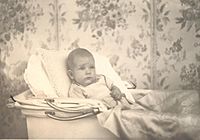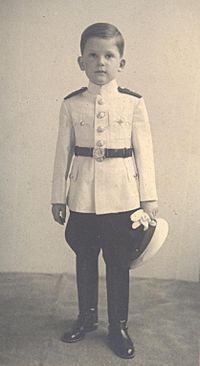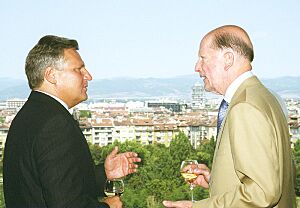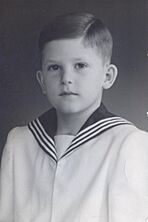Simeon Saxe-Coburg-Gotha facts for kids
Quick facts for kids Simeon II
|
|
|---|---|
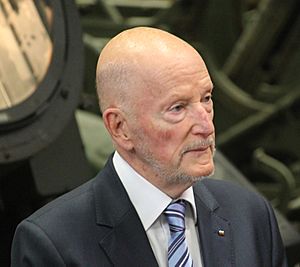
Simeon in 2017
|
|
| Tsar of Bulgaria | |
| Reign | 28 August 1943 – 15 September 1946 |
| Predecessor | Boris III |
| Successor | Monarchy abolished Vasil Kolarov (as Acting President) |
| Prime Ministers |
See list
Bogdan Filov
Petur Gabrovski (Acting) Dobri Bozhilov Ivan Ivanov Bagryanov Konstantin Muraviev Kimon Georgiev |
| Prime Minister of Bulgaria | |
| In office 24 July 2001 – 16 August 2005 |
|
| President | Petar Stoyanov Georgi Parvanov |
| Deputy | Nikolay Vasilev Lydia Shuleva Kostadin Paskalev Plamen Panayotov |
| Preceded by | Ivan Kostov |
| Succeeded by | Sergey Stanishev |
| Leader of the National Movement Simeon the Second party | |
| In office 6 April 2002 – 28 November 2009 |
|
| Preceded by | Position established |
| Succeeded by | Hristina Hristova |
| Born | 16 June 1937 Princess Clementine Hospital, Sofia, Tsardom of Bulgaria |
| Spouse | |
| Issue |
|
| House | Saxe-Coburg and Gotha-Koháry |
| Father | Boris III of Bulgaria |
| Mother | Giovanna of Savoy |
| Religion | Eastern Orthodox |
| Signature |  |
Simeon Borisov Saxe-Coburg-Gotha was born on June 16, 1937. He is a Bulgarian politician who was the last Tsar (king) of the Tsardom of Bulgaria. He reigned as Simeon II from 1943 until 1946.
In 1946, the monarchy was ended by a public vote, and Simeon had to leave the country. After communism fell in Bulgaria, Simeon returned home in 1996. He then started a political party called the National Movement for Stability and Progress. His party won the 2001 election, and Simeon became the prime minister of the Republic of Bulgaria from 2001 to 2005.
Simeon was only six years old when his father, Boris III of Bulgaria, passed away in 1943. Because he was so young, a group of people called a regency council ruled for him. This group was led by his uncle, Kiril, Prince of Preslav, General Nikola Mihov, and Prime Minister Bogdan Filov.
After his time as prime minister, Simeon's party joined a government with other parties in 2005. In 2009, his party did not win any seats in the parliament, and he decided to retire from politics.
As of 2025, Simeon is one of only two living people who were heads of state during World War II. The other is the 14th Dalai Lama. Both had roles that were mostly symbolic at the time.
Contents
Royal Life
Simeon was born to Boris III of Bulgaria and Giovanna of Italy. When he was born, his father sent an air force officer to the Jordan River to get water for Simeon's baptism. He became Tsar on August 28, 1943, after his father died. His father had just returned to Bulgaria from a meeting with Adolf Hitler. Since Simeon was only six years old, his uncle Prince Kiril, Prime Minister Bogdan Filov, and Lt. General Nikola Mihov were chosen to rule as regents.
Under his father, Bulgaria joined the Axis powers during World War II. However, Bulgaria still kept friendly relations with the Soviet Union. Despite this, on September 5, 1944, the Soviet Union declared war on Bulgaria. Three days later, the Soviet army entered the country without any fighting. On September 9, 1944, Prince Kiril and the other regents were removed from power by a coup supported by the Soviet Union. They were arrested. Sadly, the three regents and other important leaders were arrested and did not survive.
Leaving Bulgaria
The royal family, including Queen Giovanna, Simeon, and his sister Maria-Louisa, stayed at Vrana Palace near Sofia. Three new regents, who were Communists, were appointed. On September 15, 1946, a public vote was held while the Soviet army was present. This vote asked if Bulgaria should stop being a monarchy and become a republic. The official results showed that 95.6% of people voted to end the monarchy, which had lasted for 68 years. This vote went against the Tarnovo Constitution, which said that any change to the country's government could only be made by a special assembly called by the Tsar.
On September 16, 1946, the royal family had to leave Bulgaria. They were allowed to take many of their belongings with them. They first went to Alexandria, Egypt, where Simeon's grandfather, Victor Emmanuel III, the former king of Italy, was also living in exile. In 1951, Simeon studied at Victoria College there. In July 1951, General Francisco Franco's government in Spain offered the family a safe place to live. In 1954, Simeon took part in a special ship tour with King Paul of Greece and Queen Frederica. This trip was known as the "Cruise of the Kings" and included over 100 royal family members from across Europe.
Education and Work
In Madrid, Spain, Simeon studied at the Lycée Français. On June 16, 1955, when he turned 18, Simeon made a public statement to the Bulgarian people. He said he was still the Tsar of Bulgaria and wanted to rule in a way that was different from the communist government at the time. In 1958, he went to Valley Forge Military Academy and College in the United States. He was known as "Cadet Rylski No. 6883" and became a second lieutenant. From 1959 to 1962, back in Spain, Simeon studied law and business.
After his studies, he became a businessman. For 13 years, he was the head of the Spanish part of Thomson, a French company that makes defense and electronics. He also advised companies in banking, hotels, electronics, and food services.
Family Life
On January 21, 1962, Simeon married Margarita Gómez-Acebo y Cejuela, a Spanish noblewoman. They had five children: four sons (Kardam, Kiril, Kubrat, and Konstantin) and one daughter, Kalina. All of his sons were given names of Bulgarian Tsars. His daughter has a Bulgarian name.
- Kardam (1962–2015) married Miriam Ungría y López. They had two sons, Boris and Beltran.
- Kiril (born 1964) married María del Rosario Nadal y Fuster de Puigdórfila. They have three children: Mafalda, Olimpia, and Tassilo.
- Kubrat (born 1965) married Carla María de la Soledad Royo-Villanova y Urrestarazu. They have three sons: Mirko, Lukás, and Tirso.
- Konstantin-Assen (born 1967) married María García de la Rasilla y Gortázar. They have twins, Umberto and Sofia.
- Kalina (born 1972) married Antonio José "Kitín" Muñoz y Valcárcel. They have a son, Simeon Hassan Muñoz.
Return to Politics
In 1990, after communism ended, Simeon received a new Bulgarian passport. In 1996, 50 years after the monarchy was abolished, Simeon returned to Bulgaria. Many people welcomed him. At that time, he did not make any political announcements. He had also said in a TV interview in 1990 that he would not claim any royal properties in Bulgaria. However, these feelings changed after he became prime minister, as he began to try and get back large areas of royal property in Bulgaria that belonged to the monarchy before 1945.
In 2001, Simeon, who was now known as Simeon Borisov Saxe-Coburg-Gotha, announced he would return to Bulgaria to start a new political party. This party was called the National Movement Simeon II (later renamed NMSP). It focused on "reforms and political honesty." Simeon promised that within 800 days, Bulgarians would see clear positive changes from his government and have a much better quality of life.
Becoming Prime Minister
The NMSP party won a big victory in the parliamentary elections on June 17, 2001. They won 120 out of 240 seats in Parliament, beating the two main existing political parties. Simeon became Prime Minister of Bulgaria on July 24, forming a government with the Movement for Rights and Freedoms (MRF) party. He chose many experts and people with Western education in economics to be ministers in his government.
During his time as prime minister, he received the Path to Peace Award in 2002. Bulgaria also joined NATO and became part of the U.S.-led group against Iraq.
In the 2005 elections, Simeon's party came in second. They joined a large government with the Bulgarian Socialist Party and the Movement for Rights and Freedoms. Simeon was given the unofficial role of Chairman of the Coalition Council.
In the 2009 elections, his party only received 3.01% of the votes and did not win any seats in Parliament. Soon after, on July 6, Simeon also stepped down as the leader of his party.
Thoughts on Monarchy
Simeon has not officially given up his claim to the Bulgarian throne. He and his family often appear in the media and make political moves in Bulgaria. When he was in exile, he used the title "Tsar of the Bulgarians" in his political statements. However, since returning to Bulgaria, Simeon has avoided saying whether he wants the monarchy to be restored. When he became Prime Minister, Simeon promised to support the current republican constitution.
Autobiography
Simeon wrote a book about his life in French called Siméon II de Bulgarie, un destin singulier. It was released in Bulgaria on October 28, 2014. It was first shown at the UNESCO headquarters in Paris on October 22, 2014.
Titles and Honors
Simeon has held several titles throughout his life:
- June 16, 1937 – August 28, 1943: His Royal Highness The Prince of Turnovo
- August 28, 1943 – September 15, 1946: His Majesty The Tsar of the Bulgarians
- September 15, 1946 – present: His Majesty Tsar Simeon II of the Bulgarians (a courtesy title)
- July 24, 2001 – August 16, 2005: His Excellency Simeon Saxe-Coburg-Gotha
The Bulgarian Orthodox Church announced on May 1, 2015, that Simeon Saxe-Coburg-Gotha would be called Tsar of Bulgaria in all church services.
Royal Family Honors
 House of Saxe-Coburg-Gotha-Koháry: Grand Master of the Order of Saints Cyril and Methodius
House of Saxe-Coburg-Gotha-Koháry: Grand Master of the Order of Saints Cyril and Methodius House of Saxe-Coburg-Gotha-Koháry: Grand Master of the Royal Order of Saint Alexander
House of Saxe-Coburg-Gotha-Koháry: Grand Master of the Royal Order of Saint Alexander House of Saxe-Coburg-Gotha-Koháry: Grand Master of the Royal Order of Bravery
House of Saxe-Coburg-Gotha-Koháry: Grand Master of the Royal Order of Bravery House of Saxe-Coburg-Gotha-Koháry: Grand Master of the Royal Order of Civil Merit
House of Saxe-Coburg-Gotha-Koháry: Grand Master of the Royal Order of Civil Merit House of Saxe-Coburg-Gotha-Koháry: Grand Master of the Royal Order of Military Merit
House of Saxe-Coburg-Gotha-Koháry: Grand Master of the Royal Order of Military Merit
Bulgarian State Honors
 Bulgaria: Grand Cross of the Order of Stara Planina
Bulgaria: Grand Cross of the Order of Stara Planina
Honors from Other Countries
 Belgium: Grand Cross of the Order of the Crown
Belgium: Grand Cross of the Order of the Crown France: Grand Cross of the Order of the Legion of Honour
France: Grand Cross of the Order of the Legion of Honour Greek royal family: Knight Grand Cross of the Royal Order of the Redeemer
Greek royal family: Knight Grand Cross of the Royal Order of the Redeemer Italian royal family: Knight of the Supreme Order of the Most Holy Annunciation
Italian royal family: Knight of the Supreme Order of the Most Holy Annunciation Vatican: Knight Grand Cross of the Order of the Holy Sepulchre
Vatican: Knight Grand Cross of the Order of the Holy Sepulchre Sovereign Military Order of Malta: Bailiff Knight Grand Cross of Honour and Devotion of the Sovereign Military Order of Malta
Sovereign Military Order of Malta: Bailiff Knight Grand Cross of Honour and Devotion of the Sovereign Military Order of Malta Jordan: Grand Cordon of the Supreme Order of the Renaissance
Jordan: Grand Cordon of the Supreme Order of the Renaissance Jordan: Grand Cordon of the Order of Independence
Jordan: Grand Cordon of the Order of Independence Palestine: Grand Collar of the Order of Palestine
Palestine: Grand Collar of the Order of Palestine Spain: Knight Grand Cross of the Order of Charles III
Spain: Knight Grand Cross of the Order of Charles III Spain: Knight of the Order of the Golden Fleece
Spain: Knight of the Order of the Golden Fleece
Awards
 European Union: Paneuropean Union integration award
European Union: Paneuropean Union integration award Romania: Honorary degree from the University of Bucharest
Romania: Honorary degree from the University of Bucharest Spain: Adoptive Son of Madrid
Spain: Adoptive Son of Madrid
See also
 In Spanish: Simeón de Bulgaria para niños
In Spanish: Simeón de Bulgaria para niños
- The Boy Who Was a King, a 2011 Bulgarian documentary.
- House of Saxe-Coburg and Gotha


